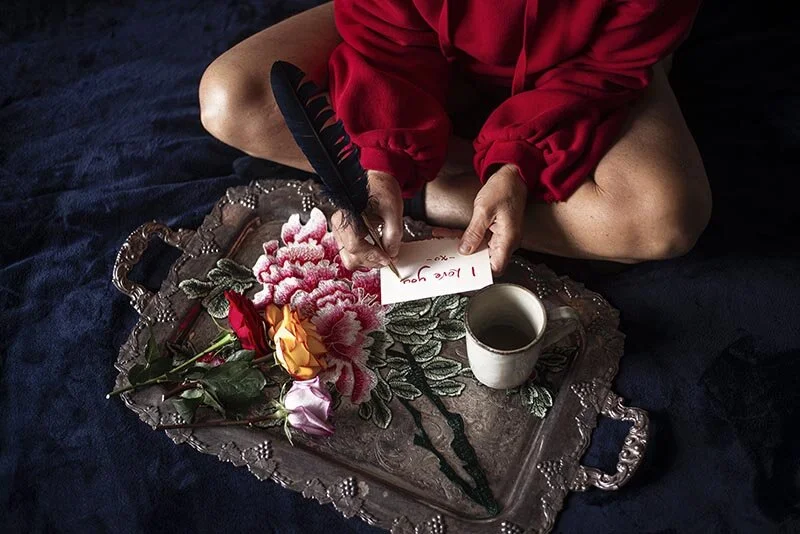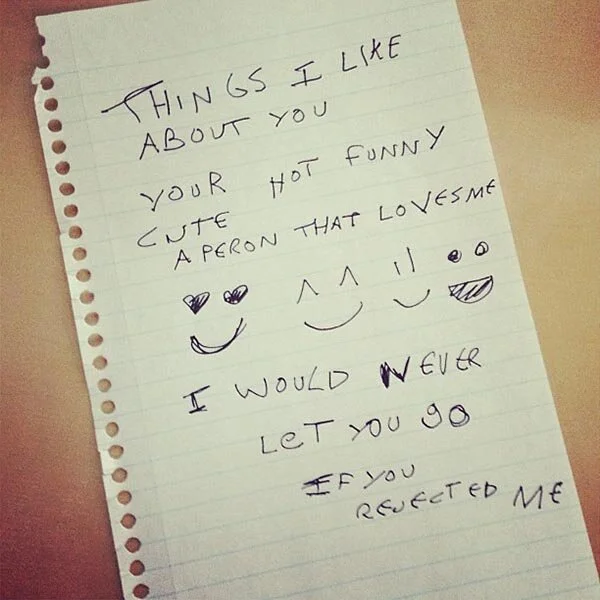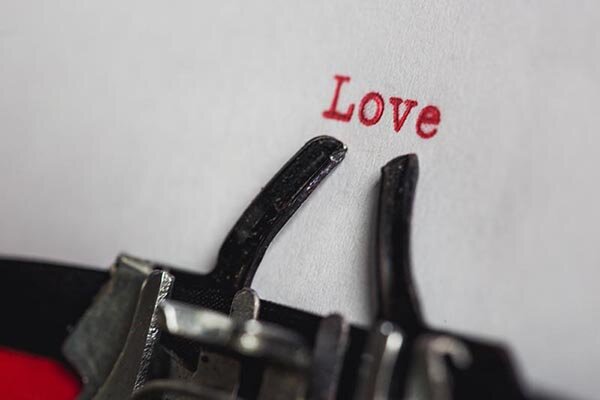Sending Love Letters To Strangers
For those who have good vibes to share — but nobody in particular to send them to — these organizations can help.
By Hannah Cowan
Sending a love letter is arguably one of the most personal ways to show someone you care.
In a world that is slowly becoming less and less dependent on paper, it’s an archaic and very intentional means of reaching out that requires more effort than a mere DM or quick text.
But before emails and the internet, love letters were commonly exchanged. Everyone sent them, altering the fabrics of their lives with a mere paper, pen, and burst of emotions. Frida Kahlo, Ernest Hemingway, Beethoven, Marilyn Monroe: They all sent and received letters oozing with love and affection.
Even though it’s gone out of style, people, it turns out, still love getting handwritten letters.
A recent U.S. survey found that 62% of women would choose a handwritten love letter from their partner as a Valentine’s Day gift over candy, flowers, jewelry, or a romantic dinner.
It might seem insignificant, but clearly it’s the little things that can mean the most sometimes.
Related:
“You’ve Got (Really Old) Mail”
If you want to write a love letter but don’t have anyone to send it to, or if you want to write a love letter to someone you don’t know, you can do both. There are a handful of organizations dedicated to sending love letters to people who might need a burst of support and positivity — everyone from kids to breast cancer patients to your neighbor down the block.
Sometimes something as simple as a kind piece of mail can make someone’s shitty day just a tiny bit better.
Send a love letter to Juliet
Juliet Capulet, the love interest of Romeo Montague, might be a fictional character, but she receives mail nonetheless.
Photo: Irina/Flickr
Each year, admirers of the heroine send her more than 50,000 love letters, addressing them to the Juliet Club in Verona, Italy. The volunteer-run organization, which is staffed by Juliet’s so-called “Secretaries,” holds an annual competition wherein they select the three most beautifully written love letters she received that year.
The winning letters are then published on their website for all to read, so make sure, if you send Juliet a letter, not to get too revelatory or personal.
The tradition itself started a long time ago, possibly centuries back. People would come to Verona and leave love letters by Juliet’s grave. In the 1930s, Ettori Solimani, the guardian of her tomb, began replying to the letters posing as Juliet. This practice has been repeated ever since.
Anyone, anywhere can submit a love letter as language is no barrier to selecting a winner. Juliet’s Secretaries categorize the letters in boxes by language, and say the majority of the letters they get are in English.
As for why anyone would want to write a love letter to a person that doesn’t exist — not to mention one that might later get shared online — it’s actually more cathartic than you might think.
“Juliet never judges,” Elena, one of Juliet’s Secretaries, told the Swedish website, The Local.
“People tell Juliet about their love-lives, but also about friendship, family, and other problems. They often write ‘You are the only one who can understand how I feel.’ ”
And perhaps that’s exactly why writing love letters to Juliet became a tradition in the first place. Because she technically doesn’t exist, she can also technically be whoever you want her to be.
Photo: Scouse Smurf/Flickr
Send a love letter to someone who really needs it
Do you know someone who is going through a rough patch in their life and needs hope? Or maybe you don’t but you’ve been there yourself and would like to provide support for others who are going through similar stuff?
That’s the thinking behind More Love Letters, an organization that allows you to nominate yourself or someone you know to receive love letters. If chosen, your address — and story — are published online so that people from all over the world can send you love letters.
Each week, a new story about a person who could use love letters is listed on their website and people are encouraged to send them positive mail.
Photo: Meagan Fisher/Flickr
More Love Letters was started by Hannah Brencher in 2011. In a TED talk she gave in 2012, Brencher talked about how her mother didn’t believe in technology, so while she was away at college, she’d often find herself waiting by the mailbox to see if her mother had sent her something.
After college, Brencher moved to New York City where she became kind of depressed. On a lark, she decided to start randomly scattering love letters around the city. She wrote them the way her mother would write them to her and began blogging about it.
This led to an idea that would later evolve into More Love Letters.
“I posed a kind of crazy promise to the internet: that if you asked me for a hand-written letter, I would write you one, no questions asked,” Brencher explained in her TED Talk.
“Overnight, my inbox morphed into this harbor of heartbreak — a single mother in Sacramento, a girl being bullied in rural Kansas — all asking me, a 22-year-old girl who barely even knew her own coffee order, to write them a love letter and give them a reason to wait by the mailbox.”
Putting one’s address on blast for all the internet to see is a bit of a ballsy move, but it’s worth it according to those who have received them through More Love Letters. Rather than seeming impersonal, they’ve found that reading words of encouragement and support from people they don’t know can be special in their own way.
That’s certainly how a woman named Valerie felt after her sister secretly nominated her for More Love Letters’ weekly program. Wheelchair bound, Valerie had been anxiously awaiting genetic test results and was trying to mentally prepare herself for an upcoming surgery. She had been feeling particularly low until the love letters started arriving in the mail.
In all, she received more than 150 letters written by well-wishing strangers from five different countries.
“Even now it feels like a dream,” Valerie told the website Write On. “I look over at my stack of letters each night and feel a brand new hope and happiness flood through me.”
Photo: Joanna Bourne/Flickr
Send a love letter to a breast cancer patient
Breast cancer sucks and, sadly, it’s a scourge that many are likely to develop, with as many as one in every eight women in the U.S. estimated to get it in their lifetime. Scary, painful, and the antithesis of fun, breast cancer treatment is not an easy time for anyone, which is why Girls Love Mail exists.
The charity organization may not be able to make your disease go away, but it can brighten the day of a newly diagnosed breast cancer patient just a little bit with a bundle of simple, thoughtful cards.
The California-based program collects hand-written letters from anyone and works with hospitals throughout the nation to deliver the letters to their newest patients.
Girls Love Mail’s founder, Gina L. Mulligan, was inspired to start the organization after she was diagnosed with the disease at the age of 40.
She was lucky enough to receive more than 200 letters from her friends and family that not only gave her strength, but inspired her to start an organization that could do the same for other breast cancer patients.
Since 2011, that’s exactly what Girls Love Mail has done, delivering more than 66,000 love letters around the country to those who have just been given the scariest news of their life. Recovering from cancer is never a walk in the park, but at least those embarking on this path know that they are not alone, that others are rooting them on.
Photo: dhendrix73/Flickr
Send a love letter to a child
Letters of Love is an organization dedicated to giving refugee children a sense of normality and comfort through letter writing. Since 2015, it has delivered love and well-wishes to more than 30,000 kids-in-need living in Iraqi, Palestinian, Syrian, Rohingya, and Yadazi.
To send in a letter, you go to their website, fill out a form, pen your heartfelt message, and upload a selfie of yourself. Letters of Love volunteers then translate your message into the appropriate language and hand write it onto the back of your photo.
Photo: Caitlin Regan/Flickr
The organization is mostly youth-led, with volunteers as young as 13 helping to send and deliver love letters to refugee children.
Malek Sumera, a college student in Palestine, said he became an ambassador for Letters of Love after learning of the program through Instagram. Since joining, he’s given presentations at his school about the program, collected letters from his fellow students, and helped Letters of Love throw an event.
In the end, it may just be a simple letter, but both Sumera and Letters of Love know that it can mean a lot to children in-need.
“Helping people who are living in crisis is a duty for every human,” Sumera said in an interview on Medium. “At any time, the situation may worsen, and if we don’t help them now, they may never find someone to help them.”














